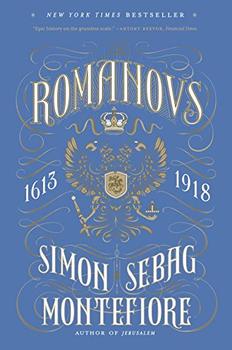Summary | Excerpt | Reviews | Beyond the Book | Readalikes | Genres & Themes | Author Bio

Critics' Opinion:
Readers' Opinion:
First Published:
May 2016, 784 pages
Paperback:
May 2017, 784 pages
 Book Reviewed by:
Book Reviewed by:
Kim Kovacs
Buy This Book
INTRODUCTION
Heavy is the cap of Monomakh.
—Alexander Pushkin, Boris Godunov
The greatest empire is to be emperor of oneself.
—Seneca, Epistle 113
It was hard to be a tsar. Russia is not an easy country to rule. Twenty sovereigns of the Romanov dynasty reigned for 304 years, from 1613 until tsardom's destruction by the Revolution in 1917. Their ascent started in the reign of Ivan the Terrible and ended in the time of Rasputin. Romantic chroniclers of the tragedy of the last tsar like to suggest that the family was cursed, but the Romanovs were actually the most spectacularly successful empire-builders since the Mongols. The Russian empire, it is estimated, grew by fifty-five square miles (142 square kilometres) per day after the Romanovs came to the throne in 1613, or 20,000 square miles a year. By the late nineteenth century, they ruled one sixth of the earth's surface— and they were still expanding. Empire-building was in a Romanov's blood.
In some ways, this book is a study of character and the distorting effect of absolute power on personality. It is partly a family story of love, marriage, adultery and children, but it is not like other such stories— royal families are always extraordinary because power both sweetens and contaminates the traditional familial chemistry: the allure and corruption of power so often trump the loyalty and affection of blood. This is a history of the monarchs, their families and retinues, but it is also a portrait of absolutism in Russia— and whatever else one believes about Russia, its culture, its soul, its essence have always been exceptional, a singular nature which one family aspired to personify. The Romanovs have become the very definition not only of dynasty and magnificence but also of despotism, a parable of the folly and arrogance of absolute power. No other dynasty except the Caesars has such a place in the popular imagination and culture, and both deliver universal lessons about how personal power works, then and now. It is no coincidence that the title "tsar" derives from Caesar just as the Russian for emperor is simply the Latin "imperator."
The Romanovs inhabit a world of family rivalry, imperial ambition, lurid glamour, sexual excess and depraved sadism; this is a world where obscure strangers suddenly claim to be dead monarchs reborn, brides are poisoned, fathers torture their sons to death, sons kill fathers, wives murder husbands, a holy man, poisoned and shot, arises, apparently, from the dead, barbers and peasants ascend to supremacy, giants and freaks are collected, dwarfs are tossed, beheaded heads kissed, tongues torn out, flesh knouted off bodies, rectums impaled, children slaughtered; here are fashion-mad nymphomaniacal empresses, lesbian ménages à trois, and an emperor who wrote the most erotic correspondence ever written by a head of state. Yet this is also the empire built by flinty conquistadors and brilliant statesmen that conquered Siberia and Ukraine, took Berlin and Paris, and produced Pushkin, Tolstoy, Tchaikovsky and Dostoevsky; a civilization of towering culture and exquisite beauty
Out of context, these excesses seem so overblown and outlandish that ascetic academic historians find themselves bashfully toning down the truth. After all, the legends of the Romanovs— the juice of Hollywood movies and TV drama series— are as potent and popular as the facts. That is why the teller of this story has to be wary of melodrama, mythology and teleology— the danger of writing history backwards— and cautious of methodology. Scepticism is essential; scholarship demands constant verification and analysis. But one of the benefits of narrative history is that each reign appears in context to give a portrait of the evolution of Russia, its autocracy and its soul. And in these larger-than-life characters misshapen by autocracy, a distorted mirror appears, which reflects the tropes of all human character right back at us.
Excerpted from The Romanovs by Simon Sebag Montefiore. Copyright © 2016 by Simon Sebag Montefiore. Excerpted by permission of Knopf. All rights reserved. No part of this excerpt may be reproduced or reprinted without permission in writing from the publisher.





The House on Biscayne Bay
by Chanel Cleeton
As death stalks a gothic mansion in Miami, the lives of two women intertwine as the past and present collide.

The Flower Sisters
by Michelle Collins Anderson
From the new Fannie Flagg of the Ozarks, a richly-woven story of family, forgiveness, and reinvention.

The Funeral Cryer by Wenyan Lu
Debut novelist Wenyan Lu brings us this witty yet profound story about one woman's midlife reawakening in contemporary rural China.
Your guide toexceptional books
BookBrowse seeks out and recommends the best in contemporary fiction and nonfiction—books that not only engage and entertain but also deepen our understanding of ourselves and the world around us.